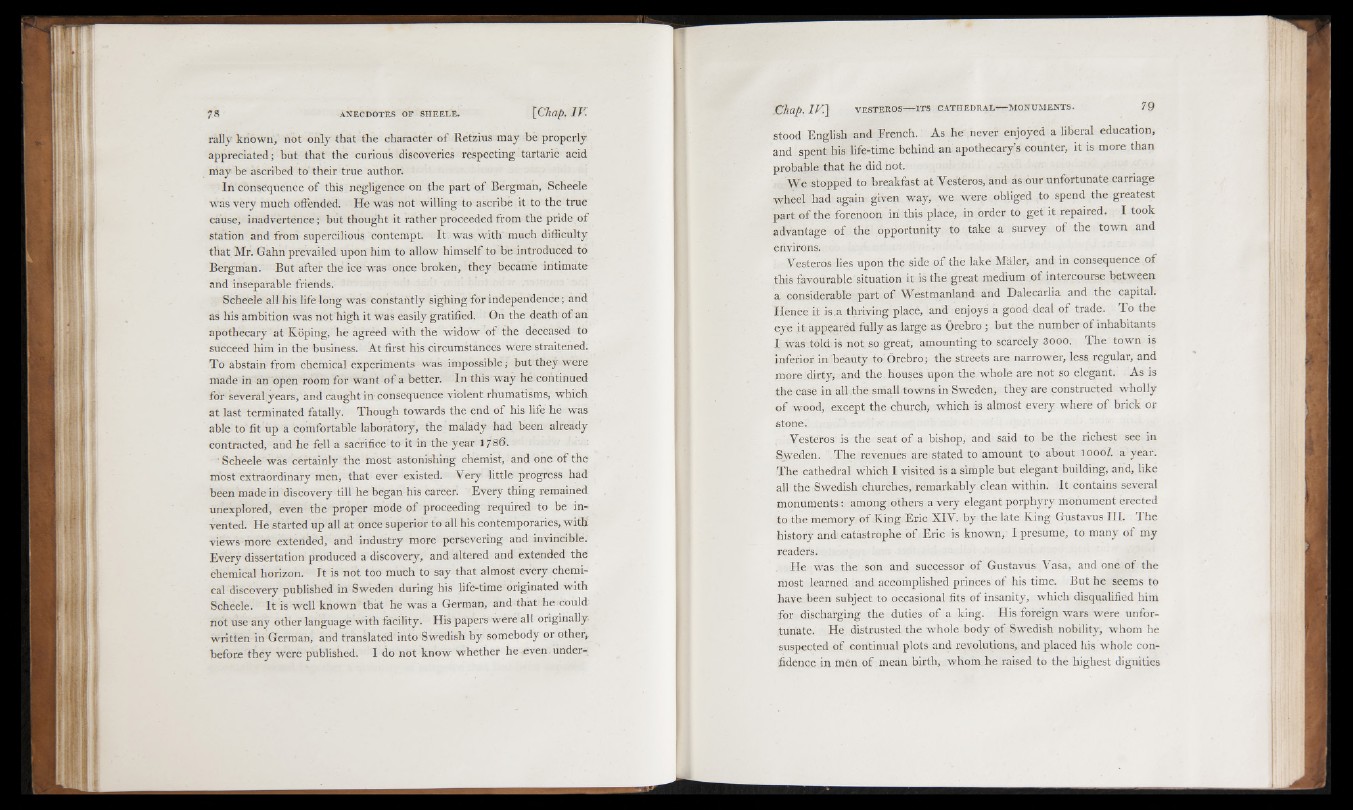
rally known, not only that the character of Retzius may bè properly
appreciated; but that the curious discoveries respecting tartaric acid
may he ascribed to their true author.
In consequence o f this negligence on the part of Bergman, Scheele
was very much offended. He was not willing to ascribe it to the true
cause, inadvertence ; but thought it rather proceeded from the pride of
station and from supercilious contempt. I t . was with much difficulty
that Mr. Gahn prevailed upon him to allow himself to be introduced to
Bergman. But after the ice was once broken, they became intimate
and inseparable friends.
Scheele all his life long was constantly sighing for independence ; and
as his ambition was not high it was easily gratified. On the death of an
apothecary at Roping, he agreed with the widow of the deceased to
succeed him in the business. At first his circumstances were straitened.
To abstain from chemical experiments was impossible; but they were
made in an open room for want o f a better. In this way hé continued
for several years, and c a u g h t in-consequence violent rhumatisms, which
at last terminated fatally. Though towards the end of his life he was
able to fit up a comfortable laboratory, the malady had been already
contracted, and he fell a sacrifice to it in the year 1786.
' Scheele was certainly the most astonishing chemist, and one of the
most extraordinary men, that ever existed. Very little progress had
been made in discovery till he began his career. Every thing remained
unexplored, even the proper mode of proceeding required to be invented.
He started up all at once superior to all his contemporaries, with
views more extended, and industry more persevering and invincible.
Every dissertation produced a discovery, and altered and extended thé
chemical horizon. It is not too much to say that almost every chemical
discovery published in Sweden during his life-time originated with
Scheele. It is well known that he was a German, and that he-could
not use any other language with facility. His papers were all originally
written in German, and translated into Swedish by somebody or other,
before they were published. I do not know whether he even.understood
English and French, As he never enjoyed a liberal education,
and spent his life-time behind an apothecary’s counter, it is more than
probable that he did not.
We stopped to breakfast at Yesteros, and as our unfortunate carriage
wheel had again given way, we were obliged to spend the greatest
part of the forenoon in this place, in order to get it repaired. I took
advantage of the opportunity to take a survey of the town and
environs.
Vesteros lies upon the side o f the lake Maler, and in consequence o f
this favourable situation it is the great medium of intercourse between
a considerable part of Westmanland and Halecarlia and the capital.
Hence it is .a thriving place, and enjoys a good deal of trade. To the
eye it appeared fully as large as Örebro; but the number of inhabitants
I was told is not so great, amounting to scarcely 3000. The town is
inferior in beauty to Örebro; the streets are narrower, less regular, and
more dirty, and the. houses upon the whole are not so elegant. As is
the case in all the small towns in Sweden, they are constructed wholly
o f wood, except the church, which is almost every where o f brick or
stone.
Vesteros is the seat of a bishop, and said to be the richest see in
Sweden. The revenues are stated to amount to about 1000Z. a year.
The cathedral which I visited is a simple but elegant building, and, like
all the Swedish churches, remarkably clean within. It contains several
monuments: among others a very elegant porphyry monument erected
to the memory of King Eric XIY. by the late King Gustavus III. The
history and catastrophe of Eric is known, I presume, to many o f my
readers.
, He was the son and successor of Gustavus Vasa, and one o f the
most learned and accomplished princes of his time. But he seems to
have been subject to occasional fits of insanity, which disqualified him
for discharging the duties of a king. His foreign wars were unfortunate.
He distrusted the whole body of Swedish nobility, whom he
suspected of continual plots and revolutions, and placed his whole confidence
in men of mean birth, whom he raised to the highest dignities